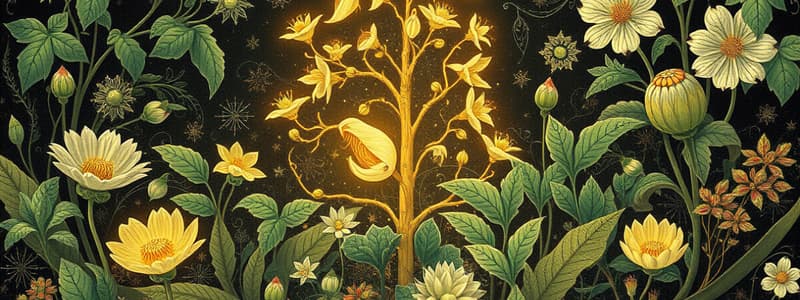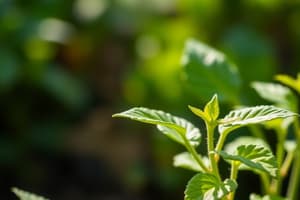Podcast
Questions and Answers
What type of organisms are plants classified as?
What type of organisms are plants classified as?
- Unicellular eukaryotic organisms
- Unicellular prokaryotic organisms
- Multicellular prokaryotic organisms
- Multicellular eukaryotic organisms (correct)
Which of the following structures is specifically responsible for the production of reproductive cells in plants?
Which of the following structures is specifically responsible for the production of reproductive cells in plants?
- Reproductive organs (correct)
- Leaves
- Stem
- Roots
What process do almost all plants use to make food?
What process do almost all plants use to make food?
- Photosynthesis (correct)
- Chemosynthesis
- Cellular respiration
- Fermentation
What do Venus fly traps primarily obtain from the insects they digest?
What do Venus fly traps primarily obtain from the insects they digest?
Why do plants need stiff stems?
Why do plants need stiff stems?
Which of the following is NOT a requirement for plants during photosynthesis?
Which of the following is NOT a requirement for plants during photosynthesis?
What characteristic is shared by plants and distinguishes them from fungi?
What characteristic is shared by plants and distinguishes them from fungi?
How do haploid plants produce their reproductive cells?
How do haploid plants produce their reproductive cells?
What was a significant evolutionary change that occurred in plants?
What was a significant evolutionary change that occurred in plants?
Which type of plants are considered to have lost the ability to photosynthesize?
Which type of plants are considered to have lost the ability to photosynthesize?
What distinguishes plants from animals in terms of reproductive methods?
What distinguishes plants from animals in terms of reproductive methods?
How do plants differ in their development cycle compared to humans?
How do plants differ in their development cycle compared to humans?
What significant ability do plants have that humans do not?
What significant ability do plants have that humans do not?
What process in humans is analogous to a plant's spore generation?
What process in humans is analogous to a plant's spore generation?
In what way do plants exhibit surprising variability in their 'lives'?
In what way do plants exhibit surprising variability in their 'lives'?
Which statement best describes the parental roles in plant reproduction compared to human reproduction?
Which statement best describes the parental roles in plant reproduction compared to human reproduction?
What analogy can be drawn between human life cycles and those of early plants?
What analogy can be drawn between human life cycles and those of early plants?
Which of the following statements about plants is incorrect?
Which of the following statements about plants is incorrect?
What characteristic of plants allows them to have a different reproductive strategy than animals?
What characteristic of plants allows them to have a different reproductive strategy than animals?
Plants can produce new individuals through the release of haploid spore cells.
Plants can produce new individuals through the release of haploid spore cells.
In a hypothetical plant-like human life cycle, individuals would be distinguishable as male or female.
In a hypothetical plant-like human life cycle, individuals would be distinguishable as male or female.
Both humans and plants start their life cycles as single cells.
Both humans and plants start their life cycles as single cells.
Humans and plants exclusively reproduce by merging egg and sperm cells.
Humans and plants exclusively reproduce by merging egg and sperm cells.
Meiosis is involved in the formation of haploid spores in plants.
Meiosis is involved in the formation of haploid spores in plants.
The earliest plants had roots, leaves, and stems.
The earliest plants had roots, leaves, and stems.
Almost all plant species are capable of photosynthesis.
Almost all plant species are capable of photosynthesis.
Plants reproduce using mating similar to animals.
Plants reproduce using mating similar to animals.
Venus fly traps are specialized plants that digest insects for nutrients.
Venus fly traps are specialized plants that digest insects for nutrients.
Cell walls of plant cells are made of chitin.
Cell walls of plant cells are made of chitin.
Flashcards
What defines a plant?
What defines a plant?
Multicellular, eukaryotic organisms with cellulose cell walls and chloroplasts.
Plant vs. Animal reproduction?
Plant vs. Animal reproduction?
Plants use haploid spores, unlike animals which use sperm and egg fusion.
How do plants develop?
How do plants develop?
Via mitosis, allowing growth independently from parents.
Plant Defining characteristics
Plant Defining characteristics
Signup and view all the flashcards
What is photosynthesis?
What is photosynthesis?
Signup and view all the flashcards
Heterotrophic plants do this
Heterotrophic plants do this
Signup and view all the flashcards
Venus flytrap nutrition?
Venus flytrap nutrition?
Signup and view all the flashcards
What conditions are essential for plant growth?
What conditions are essential for plant growth?
Signup and view all the flashcards
Plants need these things for survival.
Plants need these things for survival.
Signup and view all the flashcards
Why plants are important?
Why plants are important?
Signup and view all the flashcards
Plants produce these for reproduction
Plants produce these for reproduction
Signup and view all the flashcards
What defines a plant?
What defines a plant?
Signup and view all the flashcards
Plant vs. Animal reproduction?
Plant vs. Animal reproduction?
Signup and view all the flashcards
How do plants develop?
How do plants develop?
Signup and view all the flashcards
Plant Defining characteristics
Plant Defining characteristics
Signup and view all the flashcards
What is photosynthesis?
What is photosynthesis?
Signup and view all the flashcards
Heterotrophic plants do this
Heterotrophic plants do this
Signup and view all the flashcards
Venus flytrap nutrition?
Venus flytrap nutrition?
Signup and view all the flashcards
What conditions are essential for plant growth?
What conditions are essential for plant growth?
Signup and view all the flashcards
Plants need these things for survival.
Plants need these things for survival.
Signup and view all the flashcards
Why plants are important?
Why plants are important?
Signup and view all the flashcards
Plants produce these for reproduction
Plants produce these for reproduction
Signup and view all the flashcards
How did the earliest plants appear?
How did the earliest plants appear?
Signup and view all the flashcards
Photosynthesis inputs are
Photosynthesis inputs are
Signup and view all the flashcards
Plants use Oxygen and Minerals
Plants use Oxygen and Minerals
Signup and view all the flashcards
Plants use photosynthesis
Plants use photosynthesis
Signup and view all the flashcards
Plants are Important because
Plants are Important because
Signup and view all the flashcards
Plants use organs
Plants use organs
Signup and view all the flashcards
Plants use mitosis to
Plants use mitosis to
Signup and view all the flashcards
Study Notes
Definition of Plants
- Plants are multicellular eukaryotic organisms characterized by cell walls composed of cellulose and the presence of chloroplasts.
- Specialized reproductive organs are present, producing sperm and eggs either on the same or different plants.
Plant Life Cycles
- Unlike animals, many plants reproduce through haploid spores instead of sperm and egg fusion.
- Male and female plant forms can produce gender-specific spores, leading to distinct life stages separate from their genetic origins.
- Plant development occurs through mitosis, allowing new individuals to grow independently from their parents.
Evolutionary Context
- Plants existed for hundreds of millions of years before evolving flowers, lacking structure such as leaves and stems in their earliest forms.
- Traits defining plants include complex life cycles and unique reproductive strategies.
Photosynthesis and Nutrition
- The vast majority of plants (about 99%) photosynthesize, converting sunlight, carbon dioxide, and water into food.
- A small fraction of plant species have lost this ability and have become heterotrophic, engaging in predation (e.g., Venus flytrap).
- The Venus flytrap captures and digests insects using secreted enzymes to absorb nutrients.
Plant Requirements for Survival
- Essential conditions for plant growth include temperatures above freezing, sunlight, and access to carbon dioxide and water.
- Plants require oxygen for cellular respiration and minerals for synthesizing proteins and organic molecules.
Importance of Plants
- Plants are foundational to life on Earth, supporting ecosystems and being vital for the survival of many organisms, including humans.
Definition of Plants
- Plants are multicellular eukaryotic organisms characterized by cell walls composed of cellulose and the presence of chloroplasts.
- Specialized reproductive organs are present, producing sperm and eggs either on the same or different plants.
Plant Life Cycles
- Unlike animals, many plants reproduce through haploid spores instead of sperm and egg fusion.
- Male and female plant forms can produce gender-specific spores, leading to distinct life stages separate from their genetic origins.
- Plant development occurs through mitosis, allowing new individuals to grow independently from their parents.
Evolutionary Context
- Plants existed for hundreds of millions of years before evolving flowers, lacking structure such as leaves and stems in their earliest forms.
- Traits defining plants include complex life cycles and unique reproductive strategies.
Photosynthesis and Nutrition
- The vast majority of plants (about 99%) photosynthesize, converting sunlight, carbon dioxide, and water into food.
- A small fraction of plant species have lost this ability and have become heterotrophic, engaging in predation (e.g., Venus flytrap).
- The Venus flytrap captures and digests insects using secreted enzymes to absorb nutrients.
Plant Requirements for Survival
- Essential conditions for plant growth include temperatures above freezing, sunlight, and access to carbon dioxide and water.
- Plants require oxygen for cellular respiration and minerals for synthesizing proteins and organic molecules.
Importance of Plants
- Plants are foundational to life on Earth, supporting ecosystems and being vital for the survival of many organisms, including humans.
Studying That Suits You
Use AI to generate personalized quizzes and flashcards to suit your learning preferences.




